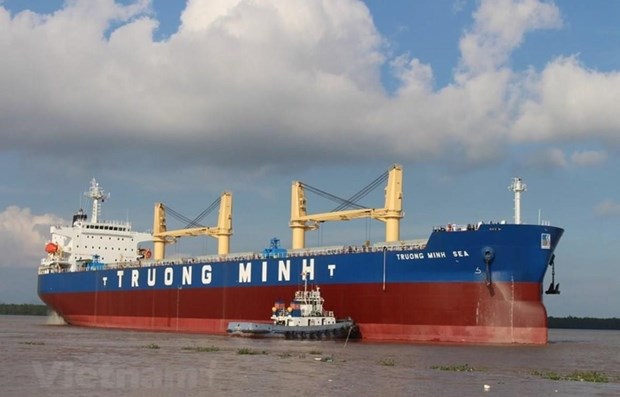Maritime transport sector: positive growth but unsteady
 The Truong Minh bulk cargo ship has a capacity of 56,200 tonnes (Photo: Viet Hung / Vietnam +)
The Truong Minh bulk cargo ship has a capacity of 56,200 tonnes (Photo: Viet Hung / Vietnam +)Hanoi (VNA) - Marine fleets and maritime logistics services have improved in recent years but only occupy a relatively small market share and face fierce competition from foreign firms.
Positive growth
As of June 2019, Vietnam's fleet has 1,568 ships, including 1,106 transport ships with a total capacity of about 7.8 million tonnes, ranking fourth in ASEAN (after Singapore, Indonesia, Malaysia) and the 30th in the world, according to the Vietnam Maritime Administration.
The average age of Vietnamese fleet is 15.6 years, 5.2 years younger than the world’s average (20.8 years). The Vietnamese merchant marine is also developing towards specialisation. It’s also worth noting that the number of container ships has increased from 19 ships in 2013 to 39 ships in 2019.
The volume of goods moving through Vietnamese seaports handled by Vietnamese shipping fleet reached over 81 million tonnes in the first six months of 2019, up 16% compared to the same period in 2018.
Agreeing that the structure of the Vietnamese fleet in recent years has improved significantly, and developed towards specialisation to meet demand for domestic freight transport, Mr. Nguyen Dinh Viet, Deputy Director of Vietnam Maritime Administration, however assessed that the fleet could only meet the needs of domestic transport and transport of import and export goods in a number of countries in the region, yet to increase the market share of freight transport.
“Domestic ships are now undertaking nearly 100 per cent of domestic sea shipping, except for shipping of LPG and bulk cement.
Domestic cargo mainly carry household items, food, coal, construction materials, machinery equipment, containers, gasoline, general goods, etc.,” Mr. Viet said.
“Our marine vessels run mainly on short-distance routes like Southeast and Northeast Asia and hold only 10 per cent of Vietnamese export-import shipping by sea,” he added.
"Vietnam's logistics companies are in large numbers but only account for a relatively small market share, mainly performing some service stages in the logistics service chain or acting as agents for foreign shipping lines," the Vietnam Maritime Administration’s leader pointed.
After a number of unhealthy competitions among businesses in this field, the Ministry of Transport has issued a decision on the price of container loading and unloading service, minimizing dumping, ensuring equality between businesses.
Losing market share
Assessing the maritime transport sector to keep an impressive growth momentum, the volume of cargo through the port carried by Vietnam's fleet reached more than 81 million tonnes, up 16 percent over the same period in 2018, Deputy Minister of Transport Nguyen Van Cong acknowledged that the Vietnam’s maritime transport had to face a decrease in the number of shipping fleet which reduced from more than 1,600 vessels in 2018 to 1,568 vessels in 2019. The decline may make the marine transport sector fail to fulfil the target of meeting 100 percent of domestic cargo transportation.
“This is a worrying number. The fleet has dropped sharply, the goal of meeting 100 percent of domestic cargo transport will be difficult to achieve as expected,” Deputy Minister Cong said.
Given that the management of the river-sea compatible ships (VR-SB) needs to be reviewed to ensure the harmony between different types of shipping, Deputy Minister Nguyen Van Cong said recently, many vehicles are operating again of the wrong nature, shipping goods from one seaport to another and if not managed in time will break the fleet.
"The Maritime Administration collaborates with relevant agencies to propose solutions to develop a more effective VR-SB model, in line with international regulations and practices on maritime safety and security," Deputy Minister Cong directed.
He also suggested that the Vietnam Maritime Administration needs to study and propose reasonable solutions such as considering the policy of tuition fee exemption and reduction, providing internship funding for marine students; exemption of income tax for Vietnamese crewmen working on board domestic ships; studying the minimum wage for seafarers to report to the Ministry of Transport for approval to attract quality maritime human resources./.











